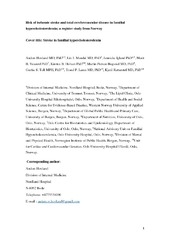Risk of Ischemic Stroke and Total Cerebrovascular Disease in Familial Hypercholesterolemia.
Hovland, Anders; Mundal, Liv; Igland, Jannicke; Veierød, Marit Bragelien; Holven, Kirsten Bjørklund; Bogsrud, Martin Prøven; Tell, Grethe S.; Leren, Trond Paul; Retterstøl, Kjetil
Peer reviewed, Journal article
Accepted version
Permanent lenke
https://hdl.handle.net/1956/19879Utgivelsesdato
2019-01Metadata
Vis full innførselSamlinger
Originalversjon
https://doi.org/10.1161/strokeaha.118.023456Sammendrag
Background and Purpose—Familial hypercholesterolemia (FH) is a common autosomal dominant disease leading to increased level of serum LDL (low-density lipoprotein) cholesterol and risk of coronary heart disease. Whether FH increases the risk of cerebrovascular disease, including ischemic stroke, is debated. Accordingly, we studied the incidence of cerebrovascular disease in a cohort of people with genetically verified FH compared with the entire Norwegian population and examined whether people in this cohort with previous cohort had increased risk of cerebrovascular disease. Methods—Incidence rates of hospitalization for cerebrovascular disease (among 3144 people with FH) and ischemic stroke (among 3166 people with FH) were estimated by linkage of FH people to Cardiovascular Disease in Norway—a nationwide database of cardiovascular disease hospitalizations (2001–2009). We calculated standardized incidence ratios and used Cox regression to estimate hazard ratios. Results—A total of 46 cases (19 women and 27 men) of cerebrovascular disease were observed in the cohort of people with FH, with no increased risk of cerebrovascular disease compared with the general population (standardized incidence ratio, 1.0; 95% CI, 0.8–1.4). Total number of ischemic strokes in the cohort of people with FH was 26 (9 women and 17 men), with no increased risk compared with the general population (standardized incidence ratio, 1.0; 95% CI, 0.7–1.5). Prior coronary heart disease significantly increased cerebrovascular disease risk in women (hazard ratio, 3.29; 95% CI, 1.20–9.00) but not in men (hazard ratio, 1.03; 95% CI, 0.45–2.37; Pinteraction=0.04). Conclusions—In a large cohort of genetically verified FH, risks of cerebrovascular disease and ischemic stroke were not increased compared with the total Norwegian population
